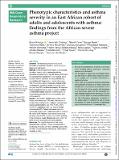Phenotypic characteristics and asthma severity in an East African cohort of adults and adolescents with asthma : findings from the African severe asthma project
Abstract
Rationale: The relationship between clinical and biomarker characteristics of asthma and its severity in Africa is not well known. Methods: Using the Expert Panel Report 3, we assessed for asthma severity and its relationship with key phenotypic characteristics in Uganda, Kenya and Ethiopia. The characteristics included adult onset asthma, family history of asthma, exposures (smoking and biomass), comorbidities (HIV, hypertension, obesity, tuberculosis (TB), rhinosinusitis, gastro-oesophageal disease (GERD) and biomarkers (fractional exhaled nitric oxide (FeNO), skin prick test (SPT) and blood eosinophils). We compared these characteristics on the basis of severity and fitted a multivariable logistic regression model to assess the independent association of these characteristics with asthma severity. Results: A total of 1671 patients were enrolled, 70.7% women, with median age of 40 years. The prevalence of intermittent, mild persistent, moderate persistent and severe persistent asthma was 2.9%, 19.9%, 42.6% and 34.6%, respectively. Only 14% were on inhaled corticosteroids (ICS). Patients with severe persistent asthma had a higher rate of adult onset asthma, smoking, HIV, history of TB, FeNO and absolute eosinophil count but lower rates of GERD, rhinosinusitis and SPT positivity. In the multivariate model, Ethiopian site and a history of GERD remained associated with asthma severity. Discussion: The majority of patients in this cohort presented with moderate to severe persistent asthma and the use of ICS was very low. Improving access to ICS and other inhaled therapies could greatly reduce asthma morbidity in Africa.
Citation
Kirenga , B , Chakaya , J , Yimer , G , Nyale , G , Haile , T , Muttamba , W , Mugenyi , L , Katagira , W , Worodria , W , Aanyu-Tukamuhebwa , H , Lugogo , N , Joloba , M , Bekele , A , Makumbi , F , Green , C , de Jong , C , Kamya , M & van der Molen , T 2020 , ' Phenotypic characteristics and asthma severity in an East African cohort of adults and adolescents with asthma : findings from the African severe asthma project ' , BMJ Open Respiratory Research , vol. 7 , no. 1 , e000484 . https://doi.org/10.1136/bmjresp-2019-000484
Publication
BMJ Open Respiratory Research
Status
Peer reviewed
ISSN
2052-4439Type
Journal article
Description
Funding: The study was funded by a project grant from the GSK Africa Non-Communicable Disease Open Lab (Project number: 8019).Collections
Items in the St Andrews Research Repository are protected by copyright, with all rights reserved, unless otherwise indicated.

